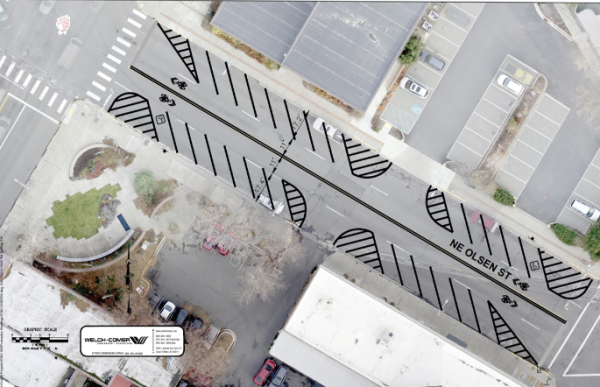Airport construction $20M over projections
Official says university land cost more to buy than first anticipated
Ryan Pugh | Daily Evergreen file
The costs for the construction projects at the Pullman-Moscow Regional Airport will be millions over the previous estimate due to things such as higher land costs.
June 7, 2018
Construction projects aimed at runway realignment at the Pullman-Moscow Regional Airport will go about $22 million over their original projections.
Due to higher-than-estimated costs in areas such as land acquisition and drainage among others, the project which is 70 percent completed will finish much higher than their $119 million project estimation in 2014, ending up at $142.5 million, Pullman-Moscow Regional Airport Executive Director Tony Bean said.
Land acquisition represented the largest increase, accounting for approximately $12 million in the extra costs, he said.
The difference in estimation versus cost came from the process the airport had to use to purchase the land using federal funds from the Federal Aviation Administration, who is providing 91.88 percent of funding with the remaining amount being covered by a number of local donors. However, these increased costs will result in only a little more than a $140,000 addition to the funding match needed from the donors.
Bean said one of the main reasons the purchasing of land ended up costing more than estimated was due to the process by which an organization must go through to buy property using federal funds, which doesn’t allow in-depth inspection of the land before making an offer.
“To make an offer we have to go get an appraisal and we have to go actually make an offer to a landowner under the Uniform Relocation Act,” Bean said. “You’re asking a real estate specialist in the infancy part of it [to estimate], where you haven’t gone on to the property and you haven’t looked at anything … you’re making an estimate based on that.”
Most of the land contributing to the rise in cost was bought from WSU, Bean said.
“When you actually get into negotiations and you start understanding what it is, that number can change and can change significantly,” he said. “The costs with WSU were significantly higher than we programmed for the purchase of the property.”
Along with the actual price of buying the land, some extra costs came in the form of “uneconomic remainder,” which occurs when a federally funded project must buy the remainder of a property, even if they don’t need it, due to the small amount left unwanted being made unusable or useless because of the purchase of the majority of the plot, Bean said.
Another reason for the discrepancy between the estimate and the actual bid costs comes from soil work. The airport couldn’t sample the portion of the land to be used that was covered by a creek, and the depth needed to reach bedrock for building purposes was deeper than expected, he said.
The airport also saw a larger increase in drainage work than previously expected. This, compounded with economic factors such as higher costs for the parts used due to last year’s hurricane season adding a lot of buyers to the market and the economy improving, led to the price hike, Bean said.
Another factor responsible for the new estimation is the fees associated with instrumental landing systems switching from local to FAA control, Bean said.
The project, which expects its final bid for a new taxiway to be finalized next year, will cause the airport to close from Sept. 8, 2019 until Oct. 3, 2019, Bean said, with commercial flights not resuming until Oct. 10.
Options for diverted flights during this time will be up to individual flyers, but Bean said options should be available in Spokane and Lewiston.




















